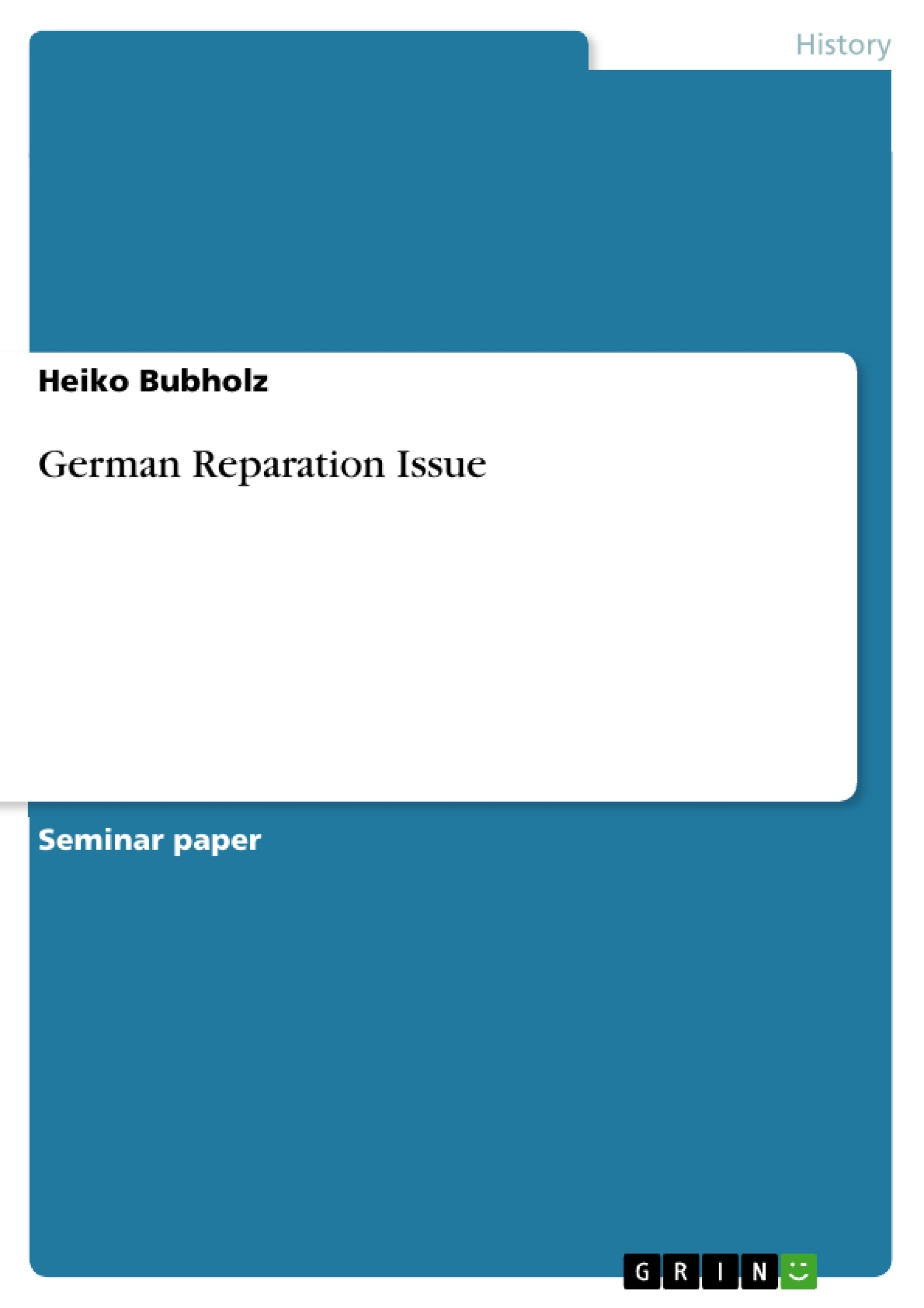The period of the Weimar Republic is one of the most piquant chapters in German history. Apart from the tyrannical Nazi regime it might be the most elaborated fraction of Germany’s modern history. The reason appears in retrospective: the stormy times of the Weimar Republic provided the ground, from which the Third Reich took of. The Weimar Republic and German revisionist tendencies originated in Versailles. The Allies’ goodwill imbued there could have led to a potential pleasing result in from of a real and just peace treaty. A new area in international relations in form of the League of Nations suffered from the beginning of the talks under the national interests of the allied nations.One result of the spoilt peace conference shall be subject of this paper: The question of reparation, linked to the so-called war guild clause caused from the proclamation of the Weimar Republic powerful political problems in domestic and foreign policy of the young German democracy. Simultaneously it sparked an internal struggle, which in the end led to the dissolving of the so hopeful spring of Germany’s first democratic republic – eventually persuading into Europe’s catastrophe in form of the Third Reich.
Thus, I want to elaborate in the following chapters, how the so-called “Reparationsproblem” influenced German domestic and foreign policy, and how this particular section of the Versailles Peace Treaty interfered in the economic, social, and political decision making process. From the present day’s perspective it is hardly questionable, why Hitler followed the weakened and unhealthy Weimar Republic. Therefore it shall be part of the following discussion if this occurrence was inevitable in the course of Europe’s history.
The devoted reader might be aware, that most of the domestic contemporary literature is more or less heavily biased by national and nationalistic attitude. Even politicians like Stresemann, widely perceived as skilled, cautious, and co-operative, followed their aim of restoration of Germany in the 1914’s setting, but in a rather pragmatic way1.
[...]
______
1 Kissinger (1994), p. 283.
Inhaltsverzeichnis (Table of Contents)
- Introduction
- The Versailles Peace Treaty
- Economic Issues
- Occupation of the Ruhr, Passive Resistance and Hyperinflation
- Dawes Plan & Young Plan
- World Economic Crisis and the End of Reparations
- Political Issues
- Conferences of Rapallo and Locarno
- "Erfüllungspolitik" and Revisionism
- Conclusion
Zielsetzung und Themenschwerpunkte (Objectives and Key Themes)
This paper examines the impact of the reparations issue, stemming from the Versailles Peace Treaty, on the political and economic landscape of the Weimar Republic. It explores how this issue influenced the development of domestic and foreign policies, the economic and social landscape, and the political decision-making process. The paper analyzes the potential connection between the reparations burden and the rise of the Nazi regime, ultimately evaluating the inevitability of this historical event.
- The Versailles Peace Treaty's impact on Germany's economic and political landscape
- The role of reparations in shaping the Weimar Republic's foreign policy
- The economic challenges faced by the Weimar Republic, including hyperinflation and the occupation of the Ruhr
- The rise of revisionist tendencies in Germany and their connection to the reparations issue
- The potential connection between the reparations burden and the rise of the Nazi regime
Zusammenfassung der Kapitel (Chapter Summaries)
- Introduction: This chapter provides an overview of the historical context of the Weimar Republic, highlighting the turbulent period that laid the groundwork for the rise of the Third Reich. It emphasizes the significance of the Versailles Treaty and the reparations issue, which served as a catalyst for Germany's political and economic struggles.
- The Versailles Peace Treaty: This chapter delves into the implications of the Treaty of Versailles, particularly the impact of the war guilt clause on the newly established Weimar Republic. It explores the various territorial losses, economic hardships, and the escalation of political tension surrounding the reparations issue.
- Economic Issues: This chapter focuses on the economic ramifications of the reparations demands imposed on Germany, including the occupation of the Ruhr, passive resistance, and hyperinflation. It analyzes the challenges the Weimar Republic faced in meeting the Allies' expectations, emphasizing the profound impact on Germany's economic stability.
Schlüsselwörter (Keywords)
The key concepts explored in this paper include the Versailles Peace Treaty, reparations, the Weimar Republic, hyperinflation, the Ruhr occupation, passive resistance, "Erfüllungspolitik," revisionism, and the rise of the Nazi regime.
Frequently Asked Questions
What was the "war guilt clause" in the Versailles Treaty?
It was a provision that forced Germany to accept full responsibility for causing World War I, which served as the legal basis for demanding reparations.
How did reparations affect the German economy?
The massive debt contributed to severe economic instability, including hyperinflation in 1923 and the subsequent occupation of the Ruhr by French and Belgian troops.
What was the "Erfüllungspolitik"?
It was a policy pursued by some Weimar politicians to cooperate with the treaty's terms to prove they were impossible to fulfill, hoping for a future revision of the conditions.
Did the reparations issue lead to the rise of Hitler?
Reparations caused deep social and political resentment, which nationalistic groups like the Nazis exploited to undermine the Weimar Republic and gain support.
What were the Dawes and Young Plans?
These were international agreements aimed at restructuring Germany's reparations payments to make them more manageable and stabilize the German economy.
- Citation du texte
- Heiko Bubholz (Auteur), 2002, German Reparation Issue, Munich, GRIN Verlag, https://www.grin.com/document/5537



